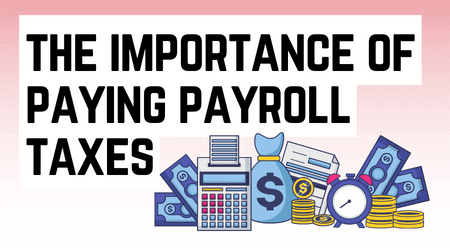If you’ve ever bounced over a deep pothole in early...
Read MoreNavigating payroll can be a complex and critical task for small businesses, and avoiding common mistakes is essential to ensure smooth operations and legal compliance. Let’s dive right into the top six payroll mistakes that small businesses often make, and how to steer clear of them:
Payroll Taxes Errors
This is the biggest and potentially most dangerous mistake you can make with payroll. The US government operates on a pay-as-you-go basis for collecting various federal, state, and local taxes, which may or may not apply to your business. Failing to meet payroll tax obligations can lead to substantial financial setbacks, as the IRS reveals that more than 40% of small businesses are fined an average of $845 annually due to payroll-tax-related issues, often stemming from missed or late payments. Tax errors emerge as a common challenge in payroll management, driven by the intricate nature of payroll taxes and their frequent modifications. From timely distribution of tax forms to meeting payroll tax deposits, managing these tasks can be overwhelming.
How to Avoid it:
Employers must distribute and file tax forms annually, including W2s and 1099s, by January 31st. Additionally, stay aware of federal, state, and local payroll tax deadlines for both deposits and filing forms. Automate payroll and set reminders to simplify these crucial tasks. You could also sign up with a payroll provider that files and pays your taxes for you, like us.
Misclassifying Employee vs. Contractor
Distinguishing between employees and contractors holds crucial implications for benefits and taxes. Misclassifying an employee as a contractor can lead to legal and financial troubles due to labor law violations and tax complexities. Though contractors may be appealing for their temporary nature, misclassification isn’t optional but a legal classification. Employers must withhold federal income taxes, social security, Medicare, and unemployment taxes from employees’ paychecks, not applicable to contractors. Misclassification can lead to penalties and back tax payments.
How to Avoid it:
Familiarize yourself with how the IRS defines the difference between an independent contractor and a full-time W2 employee.
Tax Withholding Errors
To be eligible to claim exempt status on their W-4, employees must meet specific criteria outlined by the IRS. Generally, employees can claim exempt if they had no tax liability in the previous year and expect to have no tax liability in the current year. It is essential for employees to accurately assess their tax situation and not falsely claim exempt status, as this could lead to potential penalties and legal consequences. If someone claims exempt on their Form W-4 without actually being eligible, they can anticipate a large tax bill and possible penalties when they file their tax return.
How to Avoid it:
Remember these key takeaways:
Exempt = No tax liability expected
Non-Exempt = expected tax liability
*Make sure that your employees understand the W-4 and how to fill it out to avoid problems. Also, make sure that you, as their employer, withhold the right taxes during your payroll process.*
Record Keeping
Accurate record-keeping is important for efficient payroll processes. Federal and state laws mandate record retention, spanning three to six years, encompassing W-2s, I-9s, time sheets, and pay stubs. Errors from manual data entry can lead to financial consequences, like over or underpayments due to unclear time sheets. Compliance with the Fair Labor Standards Act (FLSA) demands thorough records for nonexempt employees, including pay periods and hours worked. Proper documentation, such as W-4s and I-9s, ensures accurate payroll and obedience to tax regulations.
How to Avoid it:
Integrating your timekeeping and payroll software can significantly minimize data entry errors. With employees using their phones to clock in and out, the data is seamlessly transmitted to your accounting software, eliminating the challenges of paper time sheets and the potential for data entry mistakes. There are companies that specialize in bookkeeping if you need help. For the trucking industry we would recommend ATBS.
Law Compliance
Timeliness is crucial for both payroll and tax tasks. While daily operations can consume your attention, delaying payroll processing not only disappoints employees and destroys trust but also exposes your business to compliance violations. The Internal Revenue Service (IRS) mandates timely biweekly or monthly withholding tax deposits and the employer’s tax contributions. Certain small businesses must also fulfill quarterly estimated tax obligations on specific dates. It’s essential to recognize that business taxes operate on a “pay as you go” basis, dispelling the notion of a single tax deadline on April 15. Overlooking this could lead to consequences. Late payments incur monthly penalties from the IRS, affecting both income tax and payroll tax deposits.
How to Avoid it:
Regularly visit the DOL’s website and consider subscribing to their email list for immediate updates on new legislation. Additionally, check your state or county website to join their email list and remain informed about local regulations.
Overtime Pay Miscalculating
The Fair Labor Standards Act (FLSA) enforces the obligation for employers to pay an overtime premium, necessitating that non-exempt employees be compensated at a rate not less than one and a half times their regular pay for hours worked beyond 40 in a work week. However, the complexity of overtime pay deepens as certain states have implemented additional overtime laws alongside federal regulations, entitling employees to the more beneficial standard. It is crucial to understand that failing to provide nonexempt employees with the mandated overtime wages is unlawful, with penalties potentially resulting in back wages and additional fines as stipulated by the Department of Labor’s regulations.
How to Avoid it:
Streamline your time tracking procedures by implementing a time-tracking software that allows employees to record their hours in real-time. Managers can then review and authorize the timesheets, guaranteeing compliance with mandatory breaks and off-site punch-ins. This automated system generates comprehensive timesheet reports, simplifying the identification of overtime hours and ensuring precise employee hour records.
Bottom Line
Successfully managing payroll for small businesses requires awareness of potential pitfalls. Avoiding these common errors is crucial for maintaining smooth operations and legal adherence. Among the top six payroll mistakes frequently encountered are errors in payroll taxes, misclassification of employees and contractors, tax liability, inadequate record-keeping, non-compliance with laws, and miscalculating overtime pay. By staying informed, implementing automated systems, and seeking professional guidance, businesses can navigate these challenges and ensure accurate, compliant, and efficient payroll practices that benefit both employees and the company as a whole.
If you are struggling to manage your business’ payroll, contact us or request a quote to see if we are the right fit for you.
Before founding Superior Trucking Payroll Service, Mike was the CFO of a trucking company with 80 trucks and a thriving brokerage. This experience gave him the perspective that a payroll solution has to make the lives of the office people better. All the solutions he has designed are to benefit everyone. Our company mission is to help trucking families and that includes the company owners, the drivers, and the office.
Contact Us!
Is Superior Trucking Payroll Service Worth the Higher Cost?
You’re Not Just Buying Payroll — You’re Buying Peace of...
Read MorePayroll for Trucking Companies: We Help Your Whole Trucking Family Get Paid
If you’ve heard of Superior Trucking Payroll Service, you’ve probably...
Read MoreHow Do I Pay Myself If My LLC Is an S-Corp or C-Corp?
How do I pay myself if my LLC is taxed...
Read MoreMarch 2025 Driver Pay Update for Trucking Companies
Are your drivers leaving for better pay? Are you wondering...
Read More







